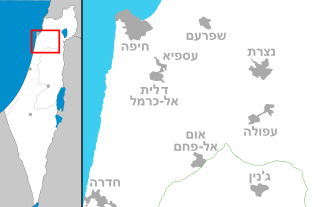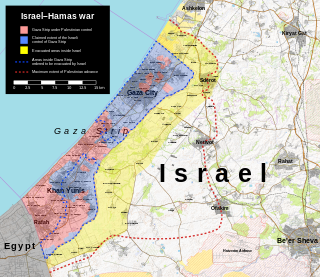Rape and sexual abuse of girls and women
On 19 February 2024, a group of United Nations special rapporteurs released a report stating "rights experts call for probe into violations against Palestinian women and girls." According to the report, there is evidence that during the Israel–Hamas war, Palestinian women and girls were subjected to wartime sexual violence. [7] According to these reports, Palestinian women and girls were also subjected to inhuman and degrading treatment by the IDF, such as they were denied menstruation pads, food and medicine, and were severely beaten, raped, assaulted, threatened with rape and sexual violence, and subjected to multiple forms of other sexual assaults. [23] [24] Palestinian women and girls were also stripped naked and searched by male Israeli army officers. [25] [26] [27] OHCHR stated that Israeli troops had photographed female detainees in “degrading circumstances” and that the photos had been uploaded online. [26] [1]
The UN report states, "Palestinian women and girls in detention have also been subjected to multiple forms of sexual assault, such as being stripped naked and searched by male Israeli army officers. At least two female Palestinian detainees were reportedly raped". [26] [1] One of the special rapporteurs; Reem Alsalem, cautioned that the reservation in reporting sexual violence was common due to reprisal concerns. Alsalem stated that since the 7 October attacks, women and girls in Israeli detention had faced an increasingly permissive attitude by Israeli officials towards sexual assault. [7] According to Middle East Eye, the phrase "at least" highlighted the fact that many occurrences remain unrecorded, as victims dread the stigma and repercussions associated with speaking out about sexual abuse in "a patriarchal society reluctant to address such atrocities". [28]
The special rapporteurs have also raised concerns over a number of Palestinian women and children going missing, with reports of children being separated from their parents. In one instance a female infant was reportedly forcibly moved to Israel by the IDF. [29] In response to the report, a spokesman for the U.S. Department of State said, "Civilians and detainees must be treated humanely, and in accordance with international humanitarian law." [30] Physicians for Human Rights-Israel also described the sexual humiliation of detainees, including sexual insults and urination on prisoners. [31]
The Associated Press in March 2024 reported on Palestinian women giving testimony about having been abused during their detention by Israel, one woman said that Israeli soldiers conducted strip searches, and during the detention, if "we raised our heads or uttered any words, they beat us on the head [...] Loud music, shouting and intimidation — they wanted to humiliate us. We were handcuffed, blindfolded, and our feet were tied in chains"; another woman alleged that an Israeli soldier smashed her face into a wall when she would not kiss the flag of Israel. [32]
A detailed and legally mandated June 2024 investigative report by the Independent International Commission of Inquiry on the Occupied Palestinian Territory stated both Israel and Hamas had committed sexual violence and torture, along with intentional attacks on civilians. [33] Regarding Israeli actions against Palestinians, the report concludes that sexual and gender-based violence (SGBV) is deployed by Israeli forces and civilians against Palestinian women and men, throughout the occupied Palestinian territories. [33] The report concludes that: "The frequency, prevalence and severity of sexual and gender-based crimes perpetrated against Palestinians since 7 October across the Occupied Palestinian Territories (OPT) indicate that specific forms of Sexual and gender-based violence (SGBV) are part of Israeli Security Forces (ISF) operating procedures." [9]
The Commission's report was completed through the use of interviewing victims and witnesses along with a variety of other means, and Israel had previously announced its refusal to cooperate. The report indicates that sexual violence was used by the IDF to push the idea of "the subordination of an occupied people" in both Gaza and the Israeli-occupied West Bank. [34]
Sexual abuse, rape, and sexualized torture of boys and men
The UN CoI report from June 2024 notes that "Men and boys experienced specific persecutory acts, including sexual and gender-based violence amounting to torture and inhuman and cruel treatment." [35]
Many detained victims by IDF forces were allegedly interrogated or abused while either naked or partially dressed, while blindfolded and made to kneel or had their hands tied behind their backs. Others were forced to strip in public and walk while being sexually harassed, at times in front of their family members who were forced to watch. While both genders were forced to do this, men and boys were reportedly targeted specifically. [33] In June 2024, men detained at the Sde Teiman detention camp stated Israeli forces had inserted "hot metal sticks" and "electric sticks" into their rectums, resulting in the death of at least one man. [36]
In June 2024, a Palestinian prisoner released from the Sde Teiman detention camp gave testimony that prisoners were raped by dogs. [37]
In July 2024, Mohammed Arab, a journalist who was arrested in March while covering the Israeli siege of Al-Shifa Hospital, testified to his lawyer Khaled Mahajneh that he had witnessed systematic use of rape, sexual violence, torture and killing in the detention camp. [37] One detainee "was completely stripped and electrocuted, his genitals were yanked". [38] Arab also testified that Israeli guards sexually assaulted six prisoners with a stick in front of other detainees. [37] As Mahajneh recounted: “When he talked about rapes, I asked him, ‘Muhammad, you’re a journalist, are you sure about this?’”...“But he said he saw it with his own eyes, and that what he was telling me was only a small part of what was happening there.” [37]
In early August, Ibrahim Salem, who appeared in one of the first leaked photos from Sde Teiman, was released after being held there for 52 days without charge. [39] He reported widespread torture, including by medical staff, as well as electrocution during interrogations, sexual abuse, constant beatings, forced stripping, genital grabbing, and frequent occurrences of rape committed by both male and female soldiers. Children were also subjected to rape. [40] [41] In one instance, a prisoner in his 40s was handcuffed and forced to bend over a desk while a female soldier inserted her fingers and other objects into his rectum. If the prisoner moved, a male soldier positioned in front of him would beat him and compel him to remain in that position. According to Salem, "Most of the prisoners will come out with rectal injuries [caused by the sexual assault]." [39] In an interview with CNN, Salem stated that Palestinians were transported "like animals" to Israeli prisons on trucks, and described being hit in the genitals with metal detectors, as well as raped with a baton. [41] Salem stated, "You’re exposing your body to male and female soldiers who harass you and touch you with objects on your sensitive parts. They hit you on your butt, pull you by the hair, call you obscenities". [42]
On 5 August 2024, B'Tselem released a report on systematic Israeli abuse, torture, sexual violence and rape of Palestinian detainees: "Welcome to Hell: The Israeli Prison System as a Network of Torture Camps". [10] [11] The report includes extensive testimonies from Palestinians. [11] The Guardian also interviewed Palestinian detainees, and reported they "back up [the] report by rights group B’Tselem, which says jails should now be labelled ‘torture camps’." [12] [10] The report includes a testimony of a Palestinian former detainee from Hebron, in the occupied West Bank, identified as "A. H.", who describes an attempt by Israeli guards to rape him with a carrot. [11] B'Tselemen introduces the testimony by noting that similar incidents were reported by other Palestinian detainees. [11]
Testimony from released Palestinian detainees collected by Channel 4 found "shocking allegations of physical, psychological and sexual abuse" committed by Israeli forces. In one testimony, a Palestinian victim of sexual violence recounts: "When the female soldier grabbed me by the balls and penis, she wounded me with her nails, digging them into my penis. I started screaming and biting the wire." [43]
Walid Khalili, a paramedic and ambulance driver with the Palestinian Medical Relief Society who was detained in Sde Teiman, described severe mistreatment by Israeli soldiers. Detainees were forced to wear diapers, suspended from chains attached to metal handcuffs, and subjected to beatings. Khalili reported enduring electric shocks every other day, stress positions, cold water dousing, and torture during interrogations. He also received no medical care despite having broken ribs, witnessed a detainee's leg being amputated due to shackling, and saw another detainee die from what appeared to be cardiac arrest. After 20 days, Israeli forces transferred Khalili to a detention facility he identified as "al-Naqab" prison. During the transfer, he was cuffed, blindfolded, and said that soldiers threatened him with rape. At al-Naqab, Khalili encountered other sick and wounded detainees, including a man who was visibly "bleeding from his bottom". The man confided in Khalili, stating that before his detention, "three soldiers took turns raping him with an M16 [assault rifle]. No one else knew, but he told me as a paramedic. He was terrified. His mental health was awful, he started talking to himself." [44]
Leaked video
In late July, a Palestinian prisoner in Sde Teiman was hospitalised with a ruptured bowel and a severe injury to his anus. He had also suffered from lung damage and broken ribs. A doctor from the detention camp reported that the prisoner sustained "a ruptured bowel, severe injuries to his anus, lung damage, and broken ribs". [45]
Subsequently, nine Israeli reservists, including a major, were arrested on suspicion they had sodomized him and suspicion of mistreating the detainee. [46] [47] Protestors, including Knesset members, broke into the base where the reservists were being detained, demanding their release. [48] [49] [50]
On August 6, Israel's Channel 12 broadcast a leaked surveillance video from Sde Teiman, which allegedly depicted Israeli soldiers gang-raping a Palestinian prisoner. [51] [52] Israeli lawmakers condemned the video leak, with Finance Minister Bezalel Smotrich calling for an "immediate criminal investigation" to uncover the source of the leak, and describing the video as having "hugely damaged Israel internationally". [53] UN special rapporteur on torture, Alice Jill Edwards, condemned the video and the surrounding case calling it "particularly gruesome" and called for the perpetrators to be held accountable. [54] When asked directly about the video, US State Department spokesperson Matthew Miller, stated that the US government was aware and had seen the video and had called for a full investigation as there should be zero tolerance for sexual abuse or rape of any detainee. [55]
International reactions
In response to the UN report, a spokesman for the U.S. Department of State said, "Civilians and detainees must be treated humanely, and in accordance with international humanitarian law." [30] The Palestinian Prisoner's Society has repeatedly stated that Palestinian men and women have been subjected to severe sexual assault, including attempted rape and violating strip searches. It cited video and dozens of testimonies documented by rights groups such as B'Tselem. [69] [70] [71]
On 8 August 2024, the US and European Union denounced alleged sexual abuse and torture of Palestinian prisoners by Israeli troops. [72] “The EU is gravely concerned by the allegations of human rights violations and abuses, including torture and sexual abuse of Palestinian detainees at the Sde Teiman military facility in Israel and elsewhere,” said Peter Stano, a spokesperson for the bloc’s diplomatic service. He also called on Israel to allow Red Cross humanitarian workers to visit prisons where Palestinians are held. [73]
U.S. State Department spokesman Matthew Miller said on August 7: "We have seen the video, and reports of sexual abuse of detainees are horrific. There ought to be zero tolerance for sexual abuse, rape of any detainee, period." [74] Miller further called on Israel to conduct a "swift" and "full" investigation of itself. [75] Philip H. Gordon, the National Security Adviser to the U.S. vice president, called for an investigation of abuse in Israeli prisons, stating, "Perpetrators of sexual violence everywhere must be held to account". [76]
The US said it could not independently confirm independently earlier reports of sexual abuse in the UN report from February, and Israel criticized the report as biased. Israel alleged that one of the report’s authors had rhetorically legitimized Hamas’s 7 October attack a few days prior to the UN panel, and that another had "publicly doubted the testimonies of Israeli victims of gender-based and sexual violence." [23] [26] [27] The Israeli mission to the United Nations in Geneva, Switzerland stated that "Israel forcefully rejects the despicable and unfounded claims published today by a group of so-called U.N. experts". [77] [25]
In an opinion piece in The New Arab , Maryam Aldossari criticized Western feminists' ignoring of Israel's sexual violence against Palestinians, stating, "Remaining silent on one of the worst atrocities against women and children in our lifetime is indefensible." [78] Alice Jill Edwards, the U.N. special rapporteur on torture, condemned the alleged sexual abuse of detainees at Sde Teiman detention camp, stating, "There are no circumstances in which sexual torture or sexualised inhuman and degrading treatment can be justified". [79]











